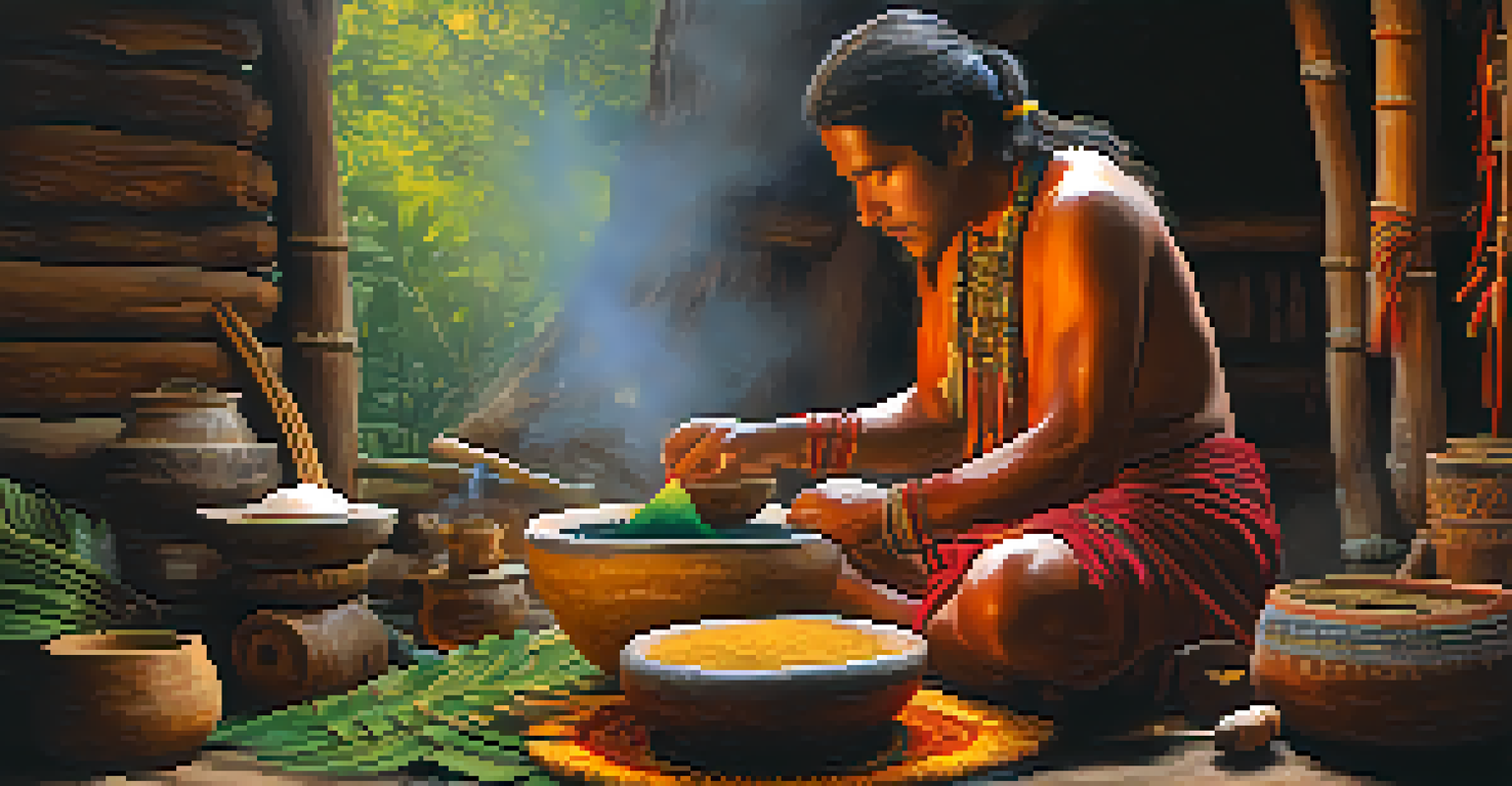Medicinal Properties of Ayahuasca in Indigenous Medicine

Understanding Ayahuasca: A Traditional Indigenous Brew
Ayahuasca is a powerful brew made from the Banisteriopsis caapi vine and the Psychotria viridis leaf, traditionally used by Indigenous tribes in the Amazon basin. This concoction has been revered not just for its psychoactive effects but also for its medicinal qualities. In Indigenous medicine, Ayahuasca serves as a gateway to spiritual and physical healing, linking the mind, body, and spirit in a holistic approach.
Ayahuasca is a powerful brew that connects us to the spirit world, facilitating healing on multiple levels.
The preparation of Ayahuasca is often a communal ritual, emphasizing its importance in cultural practices. Those who partake in this ceremony typically seek guidance from experienced shamans, who act as spiritual leaders and healers. This communal aspect fosters a sense of belonging and shared experience, which is crucial for the healing process in many Indigenous cultures.
With a growing interest in alternative therapies, Ayahuasca has gained attention worldwide. However, it's essential to approach this ancient practice with respect, acknowledging its deep cultural roots and the wisdom of those who have used it for centuries.
The Role of Ayahuasca in Healing Practices
In Indigenous medicine, Ayahuasca is often used to treat various ailments, both physical and psychological. Many users report profound experiences that can lead to emotional release, clarity of thought, and even physical healing. This brew is considered a purgative, helping to cleanse the body of toxins and emotional burdens, making space for renewal.

The healing journey facilitated by Ayahuasca often involves confronting personal traumas or unresolved issues, which can lead to transformative insights. Participants frequently describe their experiences as cathartic, leading to a release of long-held fears and anxieties. This therapeutic aspect is why many individuals seek out Ayahuasca ceremonies, hoping to find relief from the pressures of modern life.
Ayahuasca: Healing Through Tradition
Ayahuasca serves as a powerful tool for both physical and spiritual healing, deeply rooted in Indigenous practices.
Additionally, Ayahuasca is believed to enhance connection with nature and the universe, promoting a sense of unity and well-being. This not only aids in individual healing but also reinforces community ties, as shared experiences strengthen bonds among participants.
Ayahuasca and Spiritual Awakening
Beyond its physical healing properties, many Indigenous cultures view Ayahuasca as a spiritual medicine. The brew is thought to open the mind to deeper insights and connections with the divine, often leading to profound spiritual awakenings. Participants frequently report encountering spiritual guides or ancestors during their journeys, providing wisdom and support.
The use of Ayahuasca is a journey that helps individuals confront their innermost fears and traumas, leading to profound personal growth.
This spiritual dimension of Ayahuasca is integral to its use in Indigenous medicine. It reinforces the belief that healing is not just about addressing physical symptoms, but also about nurturing the spirit. For many, these experiences can lead to a greater understanding of their purpose and place in the world.
The connection between spirituality and healing is a cornerstone of many Indigenous practices. By weaving together the physical, mental, and spiritual aspects of health, Ayahuasca offers a comprehensive approach that resonates deeply with those seeking holistic healing.
Cultural Significance of Ayahuasca in Indigenous Societies
Ayahuasca is more than just a medicinal brew; it holds immense cultural significance in Indigenous societies. It is often used in ceremonies that mark important life events, such as births, marriages, and even deaths. These rituals help to reinforce cultural values and ensure the continuity of traditions among community members.
The use of Ayahuasca is deeply intertwined with the identity of various Indigenous groups. It serves as a reminder of their ancestral knowledge and connection to the land. In a world increasingly dominated by modernity, these traditions are vital for preserving cultural heritage and fostering resilience within communities.
Cultural Significance of Ayahuasca
The brew holds immense cultural importance, being integral to rituals that reinforce community values and identity.
As the world becomes more aware of Indigenous rights and practices, it's crucial to respect and honor these traditions. Engaging with Ayahuasca should be done thoughtfully, acknowledging its significance and the cultural context from which it arises.
Scientific Research on Ayahuasca's Healing Properties
In recent years, scientific interest in Ayahuasca has surged, leading to numerous studies exploring its potential therapeutic benefits. Researchers have examined its effects on mental health conditions such as depression, PTSD, and anxiety, finding promising results. Some studies suggest that the compounds in Ayahuasca may promote neuroplasticity, helping the brain form new connections that can aid in recovery.
While the anecdotal evidence from users is compelling, scientific research provides a more rigorous foundation for understanding Ayahuasca's impact. Clinical trials have shown that participants often experience significant reductions in symptoms after taking Ayahuasca. However, it's essential to approach these findings with caution, as more research is needed to fully understand its long-term effects.
Despite the challenges, the growing body of research offers hope for integrating traditional Indigenous practices with modern medicine. This bridge between cultures can lead to a more comprehensive understanding of healing and wellness.
Safety and Ethical Considerations in Ayahuasca Use
As Ayahuasca gains popularity outside Indigenous communities, it's crucial to address safety and ethical concerns. Not all ceremonies are conducted with the same level of care, and some may exploit the cultural significance of Ayahuasca. Participants should be mindful of where they choose to partake and ensure that their experience is guided by knowledgeable and respectful practitioners.
Potential risks associated with Ayahuasca use include psychological distress or adverse physical reactions, particularly for individuals with pre-existing health conditions. It's essential for participants to approach Ayahuasca with caution, ideally consulting with healthcare professionals before engaging in ceremonies. Being informed can help mitigate risks and enhance the healing experience.
Research Supports Ayahuasca's Benefits
Scientific studies suggest promising therapeutic effects of Ayahuasca on mental health conditions like depression and PTSD.
Furthermore, ethical considerations extend to the Indigenous communities themselves. As interest in Ayahuasca grows, it's vital to support and uplift these cultures rather than exploit them. This means respecting their traditions, ensuring fair compensation for shamans, and advocating for the preservation of their practices.
The Future of Ayahuasca in Global Health and Healing
The growing fascination with Ayahuasca suggests a shift towards incorporating traditional practices into global health paradigms. As more people seek alternative therapies, Ayahuasca's unique blend of physical, psychological, and spiritual healing has the potential to offer valuable insights. This could lead to a broader acceptance of holistic approaches in modern medicine.
However, the future of Ayahuasca in global health also hinges on respectful engagement with Indigenous knowledge. By prioritizing collaboration with Indigenous communities, researchers and practitioners can ensure that these ancient practices are honored and preserved. This collaborative approach can create a sustainable model for integrating traditional and modern healing methods.

As we move forward, it's essential to keep the conversation about Ayahuasca open and inclusive. By learning from Indigenous wisdom and respecting their practices, we can contribute to a more comprehensive understanding of health and wellness that benefits everyone.